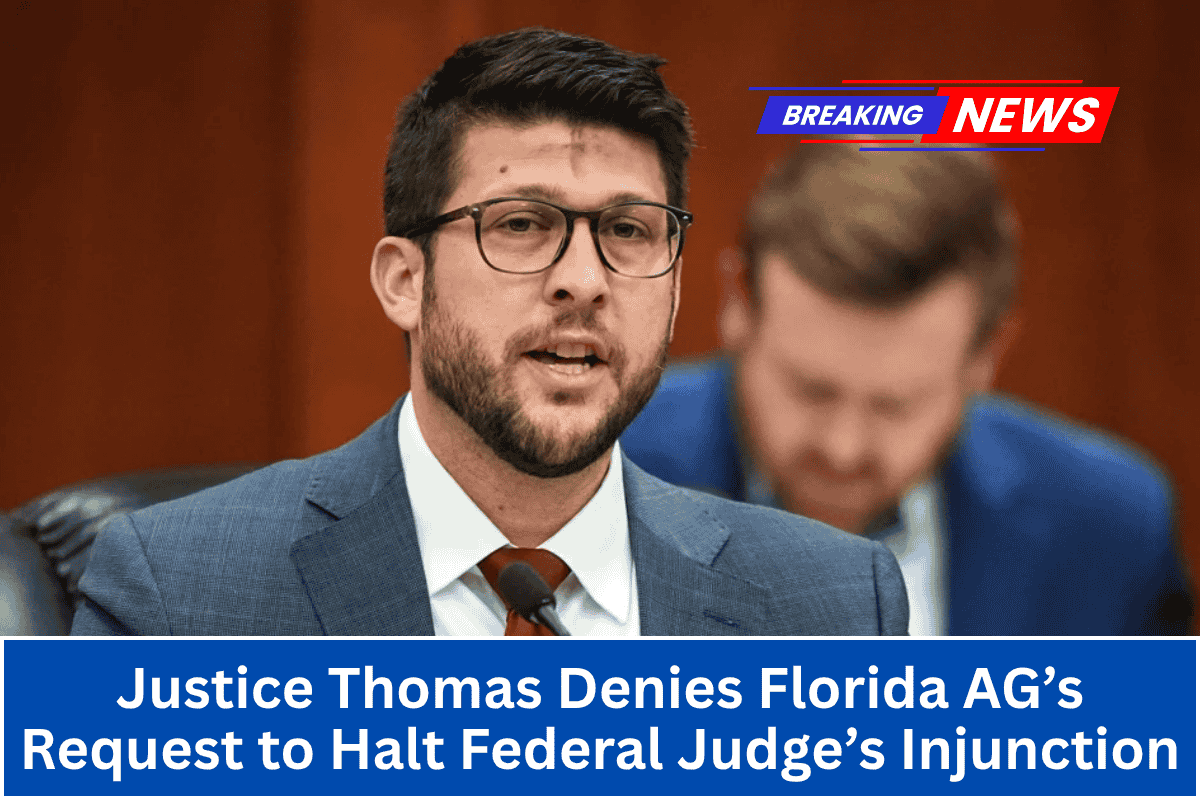In a move that has sparked considerable attention, U.S. Supreme Court Justice Clarence Thomas, alongside at least four other colleagues, declined to intervene in the case involving Florida Attorney General James Uthmeier’s demand to halt a federal judge’s injunction.
The injunction had blocked the enforcement of SB 4-C, a controversial Florida law imposing state criminal penalties for illegal immigration.
The Denial and Legal Background
On Wednesday, the Supreme Court issued a one-line order denying Uthmeier’s application for a stay of the preliminary injunction issued by U.S. District Judge Kathleen Williams. The ruling provided no further explanation or reasoning from the Court, signaling a rejection of the Florida AG’s request.
The case dates back to April, when Judge Williams, an appointee of former President Barack Obama, ruled in favor of the plaintiffs — the Florida Immigrant Coalition and the Farmworker Association of Florida.
Williams granted a temporary restraining order (TRO) and a preliminary injunction, arguing that SB 4-C violated the U.S. Constitution by attempting to assert state powers over immigration enforcement, a responsibility that, under federal law, is reserved for the federal government.
Florida AG’s Defiance and Contempt Ruling
Florida Attorney General James Uthmeier, appointed by Governor Ron DeSantis, did not accept the ruling lightly. After receiving the injunction, Uthmeier initially sent a letter acknowledging the restraining order and instructing law enforcement to comply.
However, five days later, he sent a contradictory letter claiming there was no “lawful” judicial order preventing the enforcement of SB 4-C.
In response to this defiance, Judge Williams found Uthmeier in civil contempt of court in June 2023. Williams had previously noted in her ruling that Uthmeier had made public statements indicating his refusal to follow the injunction, calling it “illegitimate.”
She cited his comments where he insisted that he would not “rubber stamp” the court’s order and that he would not direct law enforcement to stand down. This led to a further legal clash, with Uthmeier’s actions being seen as an attempt to undermine the authority of the court.
Humpty Dumpty Reference and Judicial Criticism
In her contempt ruling, Judge Williams made an interesting literary reference to Lewis Carroll’s Through the Looking-Glass, where the character Humpty Dumpty asserts that words mean whatever he wants them to mean.
Williams used this to highlight the dangerous precedent of allowing litigants to change the meaning of words to suit their own agenda.
The judge emphasized that the law cannot be manipulated to fit personal or political preferences, especially when it comes to clear and unambiguous court orders.
The Broader Legal Implications
Uthmeier’s defiance and the subsequent contempt ruling have drawn significant attention to the balance of power between state and federal authorities, especially regarding immigration enforcement.
The legal battle centers on whether Florida’s SB 4-C law exceeds the state’s authority by attempting to regulate immigration in a way that traditionally falls under federal jurisdiction.
Despite the Supreme Court’s denial to intervene, the case remains significant, as it touches on fundamental questions of law enforcement, state powers, and the extent to which government officials must adhere to court orders. The legal saga is far from over, and further developments are expected as the 11th Circuit Court of Appeals continues to review the case.
Justice Thomas’ refusal to interfere with Judge Williams’ injunction in this high-profile case marks a significant moment in the ongoing legal battle over SB 4-C in Florida.
The ruling highlights the tensions between state and federal powers, with the Florida AG’s defiance of the court order setting the stage for further legal and political ramifications. The outcome of this case will have lasting effects on the enforcement of immigration laws and the authority of federal courts over state actions.






